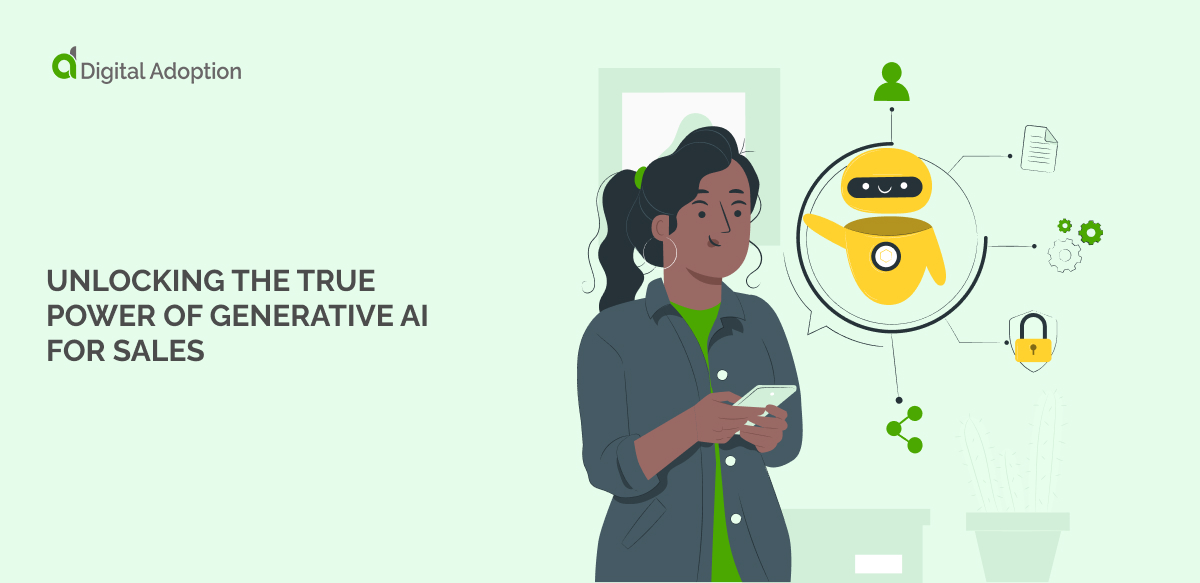Generative AI is the latest innovative technology to enter the sales industry.
It promises to unlock the true potential of artificial intelligence by allowing businesses to craft entirely new, unique digital experiences with unprecedented speed and accuracy.
By using generative AI, your sales teams can take advantage of automated insights and predictions that free them up to explore deeper, more meaningful customer relationships. This technology could have a huge impact on how we all handle sales operations.
It might sound like a thing of the future, but the reality is that generative AI is here. Major players in the sales industry are already developing their own generative AI solutions.
Microsoft now offers Viva Sales, while Salesforce is working on EinsteinGPT.
These solutions are in their infancy, but they’re here to stay. And jumping on the bandwagon right now presents a chance for you to eke out a competitive edge.
But if you’re considering this digital adoption, you probably want to know exactly what’s in it for you.
In this article, we’ll take a closer look at generative AI and how it could revolutionize the way you conduct your sales operations, and what challenges early adopters might expect to encounter.
What is Generative AI and how does it work?
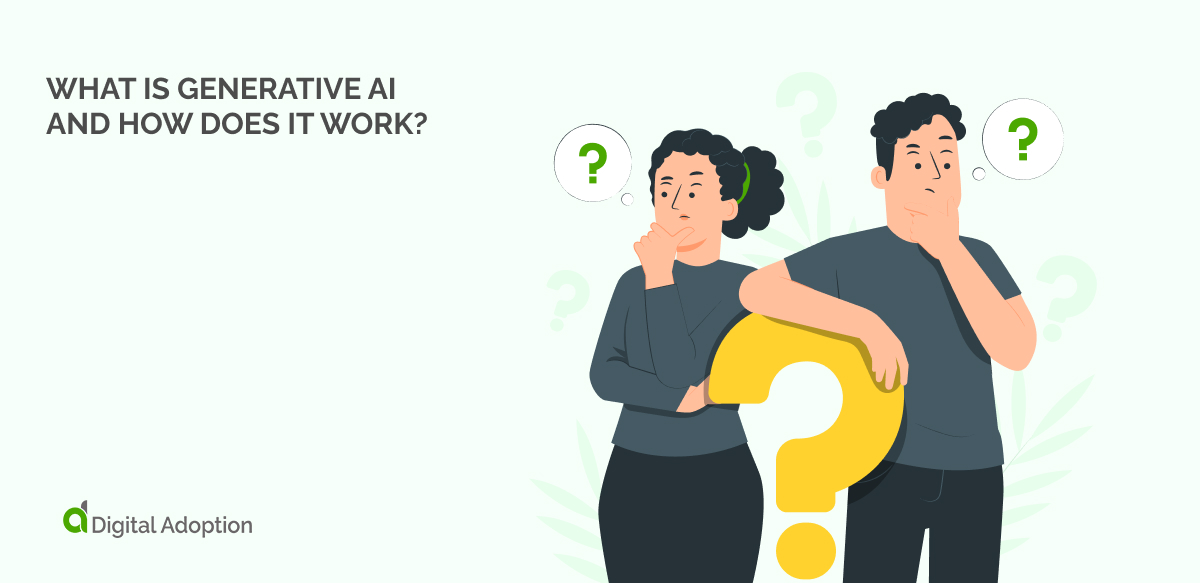
Generative AI is a type of artificial intelligence that uses machine learning algorithms to generate new, unique digital content.
Unlike traditional AI, which relies on pre-existing datasets for analysis and decision-making, generative AI creates entirely new data points from scratch.
This gives it the ability to create personalized experiences tailored to individual customers and their preferences.
The generative AI algorithms are incredibly powerful, as they can analyze huge amounts of data quickly and accurately.
In addition to generating unique content, these algorithms can identify patterns in customer behavior that could be highly valuable for sales teams.
How Generative AI could be a game-changer for Sales
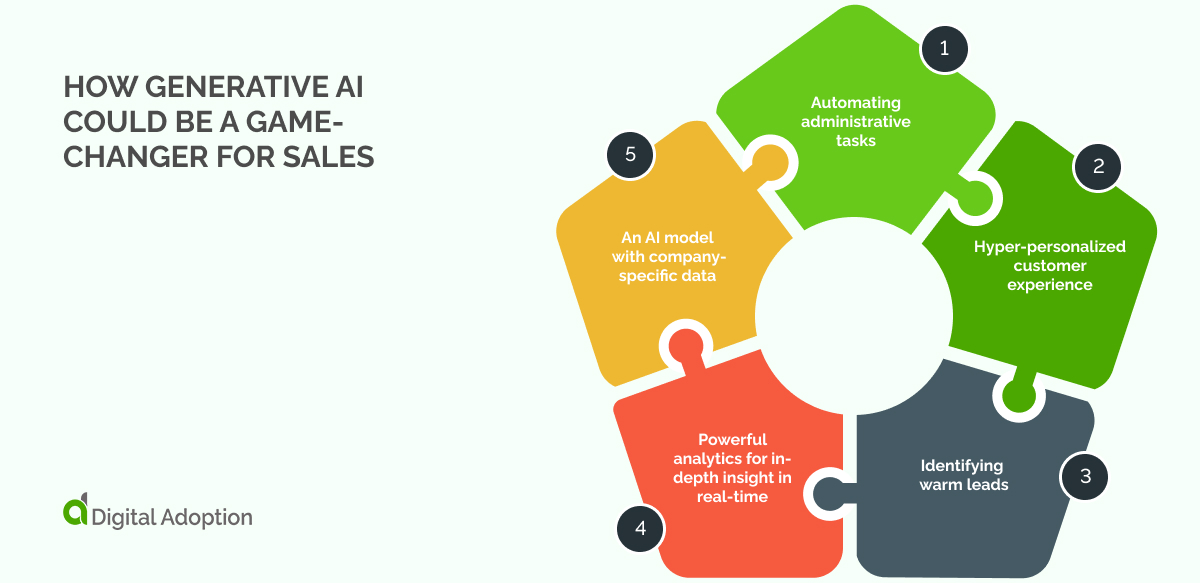
Generative AI has the potential to revolutionize the way sales teams operate.
Here’s a look at some of the most exciting and impactful ways Generative AI could be used for Sales:
Automating administrative tasks
Every sales operations team should have an automation strategy.
Generative AI can automate mundane, time-consuming tasks such as data entry and customer segmentation.
This frees up your team’s valuable time to focus on more creative, human-centered activities.
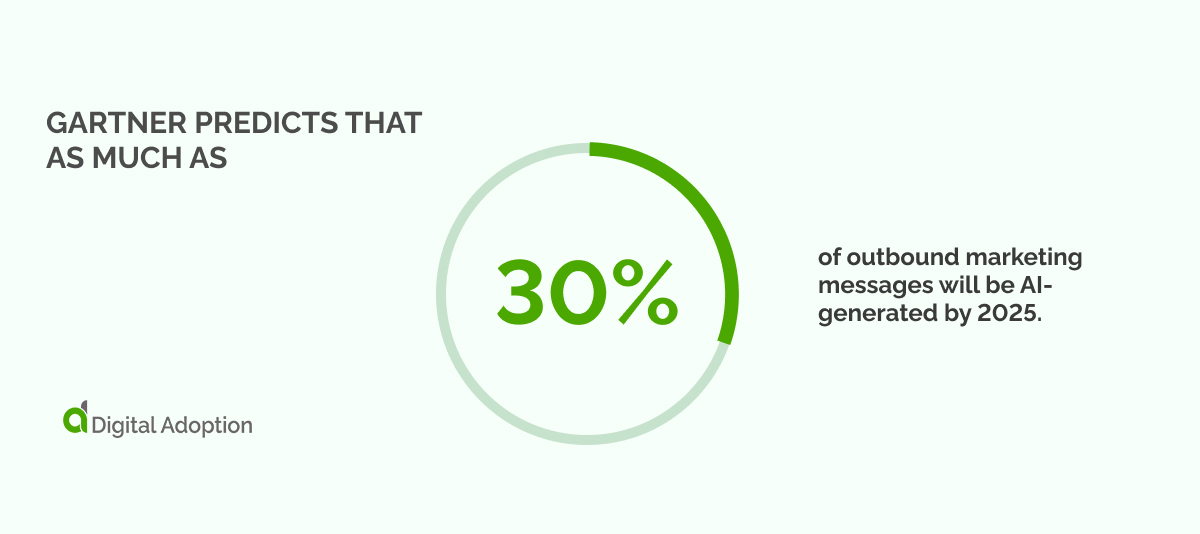
This is far and away the most common use case for generative AI in Sales. Gartner predicts that as much as 30% of outbound marketing messages will be AI-generated by 2025.
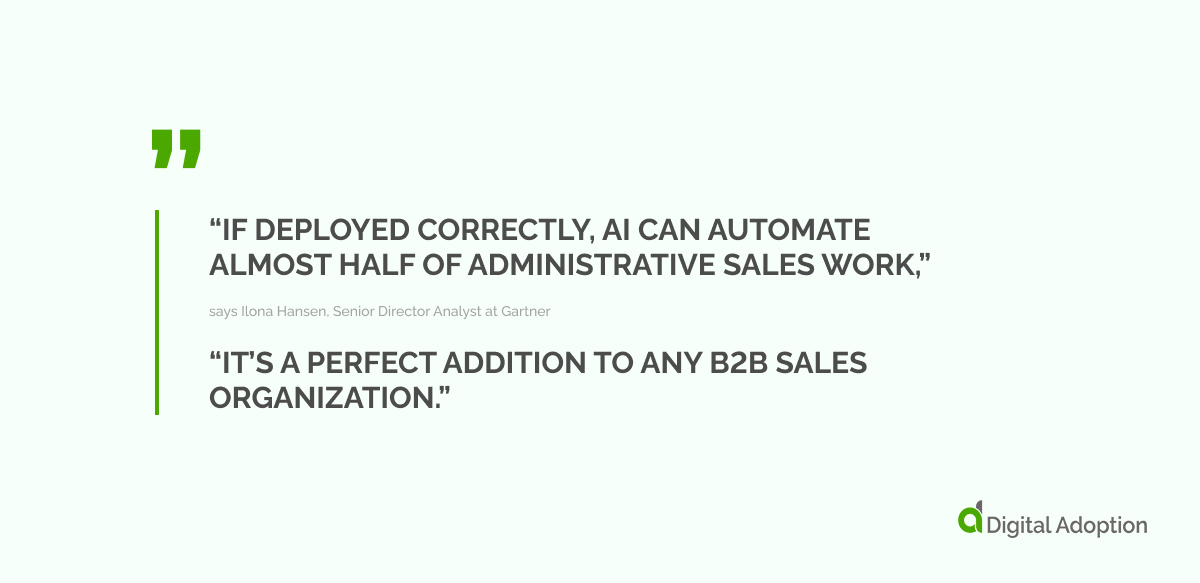
“If deployed correctly, AI can automate almost half of administrative sales work,” says Ilona Hansen, Senior Director Analyst at Gartner. “It’s a perfect addition to any B2B sales organization.”
Hyper-personalized customer experience
With generative AI, you can provide a unique and highly personalized customer experience.
This could include product recommendations tailored to their preferences or customized messaging that speaks directly to their needs.
Generative AI has natural language processing capabilities. This allows the AI to understand the context of customer queries and even detect emotions— potentially alerting a sales rep if the customer seems dissatisfied.
The modern customer wants hyper-personalized experiences, and leaning into the strengths of generative AI could give you a boost in customer engagement.
Identifying warm leads
Generative AI can quickly identify which prospects are most likely to convert into paying customers, allowing sales teams to focus their efforts on the people who need them the most.
It achieves this through the automatic creation and analysis of customer segments and personas.
With this, your sales reps could achieve 80% of the sales and 20% of the work.
Powerful analytics for in-depth insight in real-time.
Generative AI algorithms can uncover trends in customer behavior that are otherwise difficult to detect.
This enables sales teams to make data-driven decisions based on deep insights gathered from massive datasets.
The analytical capabilities of generative AI can be split into two camps: Predictive analytics and prescriptive analytics.
Predictive analytics finds correlations between data points, which could help with sales forecasting.
Prescriptive analytics uses a pre-defined sales methodology to suggest actions to move a prospect onto the next stage of the sales process.
And most importantly, this can all be done in real-time, providing sales reps with valuable insight even as they’re speaking with a prospect.
An AI model with company-specific data
Generative AI can create an AI model based on your business’s historical and current data.
This allows you to quickly identify areas of opportunity or risk and spot potential long-term trends.
In general, everything a generative AI can do, it can do better with access to company-specific data.
Is Generative AI replacing sales teams?
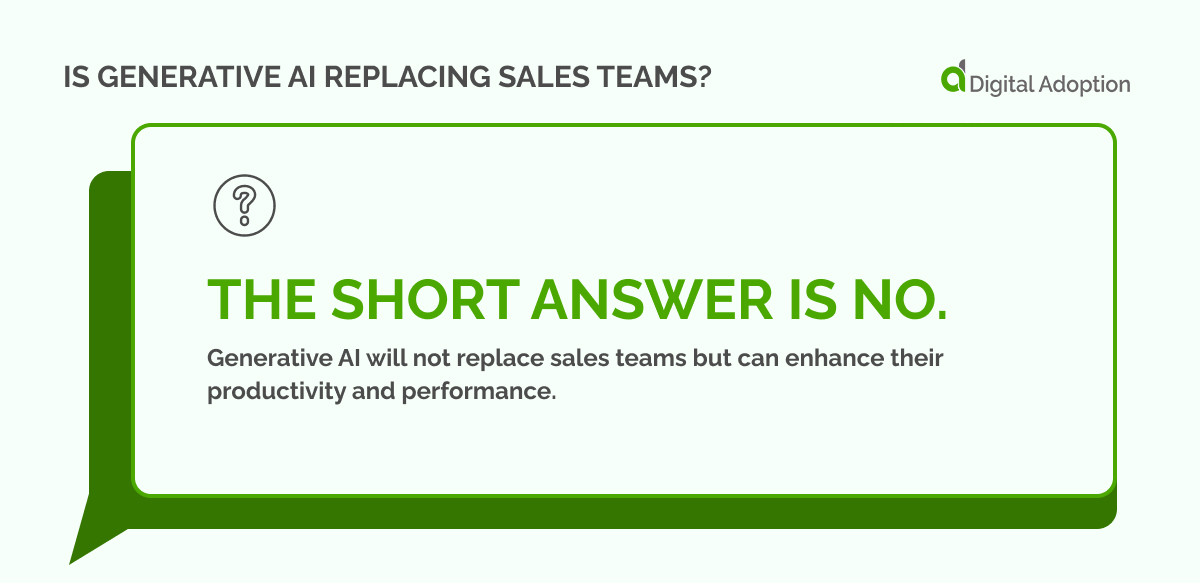
The short answer is no.
Generative AI will not replace sales teams but can enhance their productivity and performance.
With the right strategy and team in place, generative AI could be a powerful tool to help increase conversions, optimize customer experience, and maximize ROI.
It’s important to remember that generative AI should not be viewed as a replacement for your human team but rather as an extension. When used correctly, it can help sales teams work smarter and faster.
And if you’re still not so sure about that, let’s take a look at some of the common pitfalls and challenges.
Generative AI for Sales: Common pitfalls and challenges
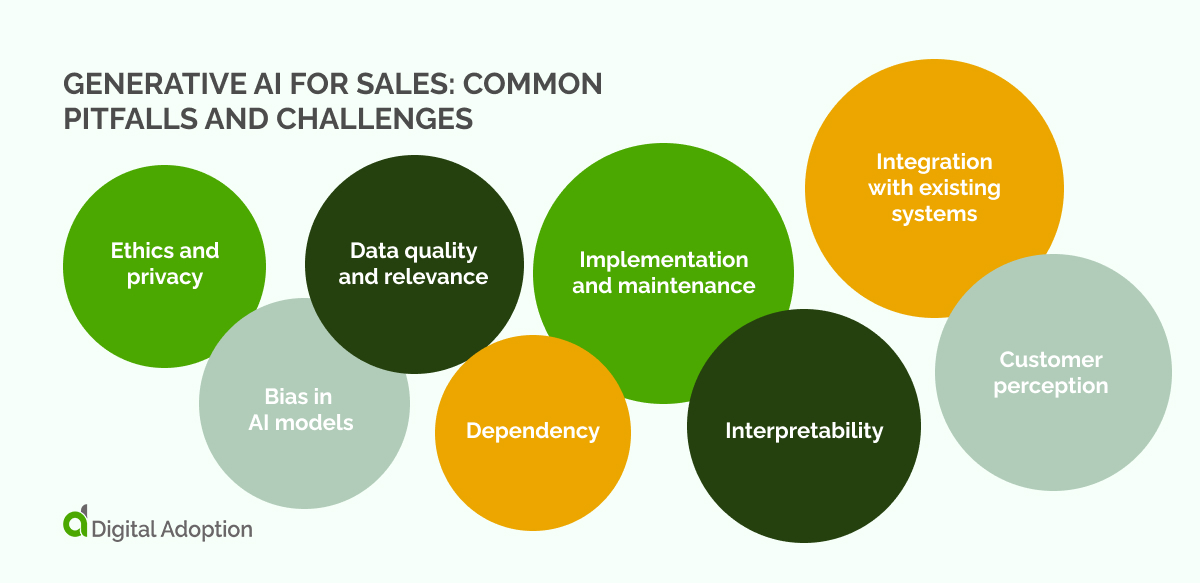
While artificial intelligence sounds futuristic (and it definitely is) it’s important to remember that we live in the real world, and generative AI for Sales has some real-world drawbacks.
Data quality and relevance
The performance of AI models largely depends on the quality and relevance of the data they are trained on.
Incomplete, outdated, or inaccurate data can lead to incorrect predictions and analyses.
It’s crucial to have robust data collection, management, and cleansing processes in place.
Ethics and privacy
Handling customer data in an ethical and legally compliant way is paramount.
This includes ensuring that data is collected with consent, stored securely, and used for its intended purpose only.
Also, transparency about how you’re using AI is important.
Bias in AI models
AI models can be biased. They can also amplify existing biases in the data they are trained on.
This could lead to unfair or discriminatory practices.
You should take care to monitor for and mitigate any potential biases in AI models.
Dependency
It can be problematic to rely too much on generative AI.
While generative AI can significantly aid the sales process, there’s no true replacement for human judgment, intuition, and interpersonal skills.
You must strike a balance between AI and human involvement.
Implementation and maintenance
Implementing AI solutions requires time, resources, and technical expertise.
You’ll need to regularly update and maintain AI models to ensure they continue to perform well as business needs and environments change.
If you’re looking to incorporate company-specific data, you’re going to need an even more specialist set of skills.
Interpretability
AI models, particularly deep learning models, can be “black boxes,” making it difficult to understand how they arrived at a particular decision or prediction.
This lack of transparency can make errors hard to identify and correct, and can lead to your sales team not trusting their generative AI tools.
Integration with existing systems
Integrating AI solutions with existing sales software or CRM systems can be challenging.
Not all systems are compatible; some may require significant customization to work together effectively.
Customer perception
Some customers may not respond positively to interactions that they know are driven by AI.
It’s essential that you’re sensitive to customer preferences in Sales, and ensure that AI enhances rather than detracts from the customer experience.
Generative AI for sales: Is it too late to be an early adopter?
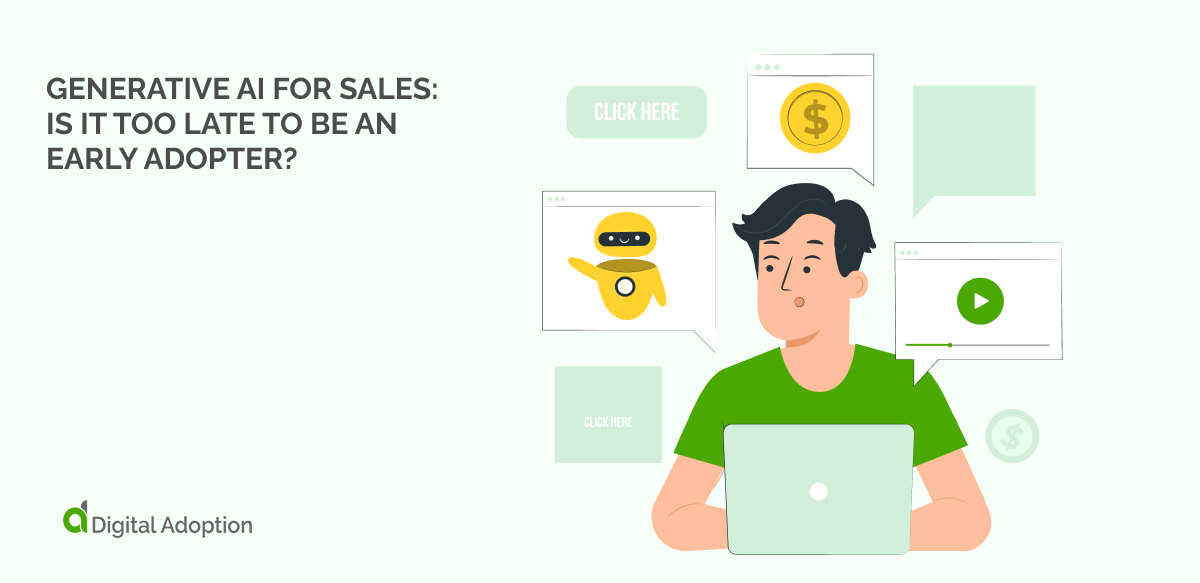
Generative AI is already being used by Sales teams to automate lead-generation tasks, create data-driven insights, and analyze customer behavior.
Eventually, it could even be used to craft entirely new products and services that meet customers’ needs more effectively and quickly than ever before.
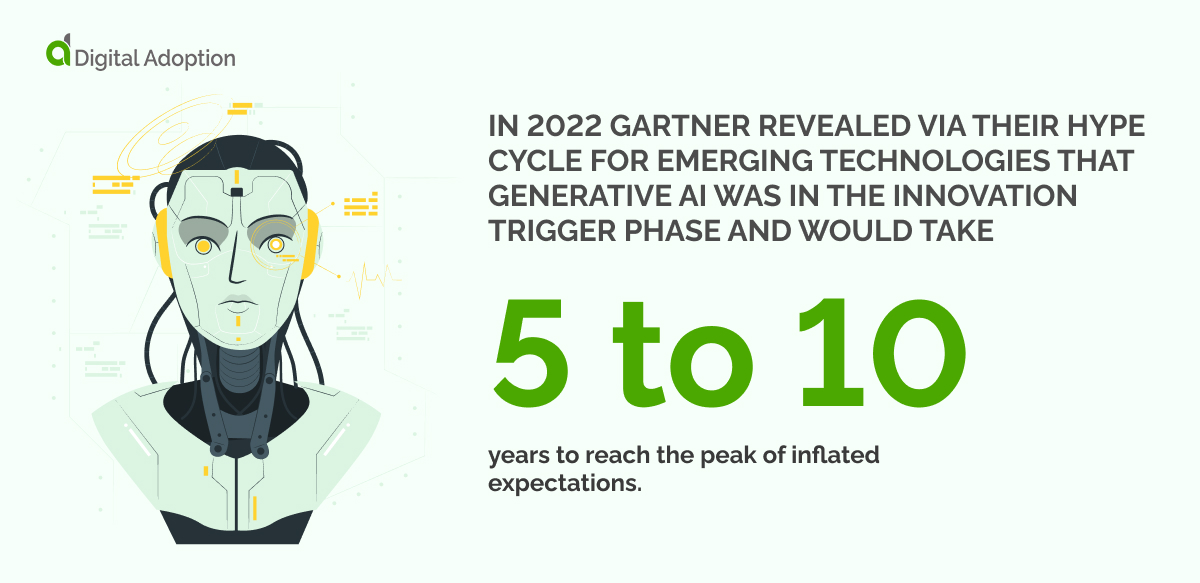
In 2022 Gartner revealed via their Hype Cycle for Emerging Technologies that generative AI was in the Innovation Trigger phase and would take 5 to 10 years to reach the peak of inflated expectations.
Put simply; we think Gartner missed the mark.
Generative AI has exploded in popularity in this last year alone. You don’t have another five years to jump on the bandwagon. It is here, and your competitors know about it.
If you want to take advantage of everything Generative AI offers, now is the time to act.

